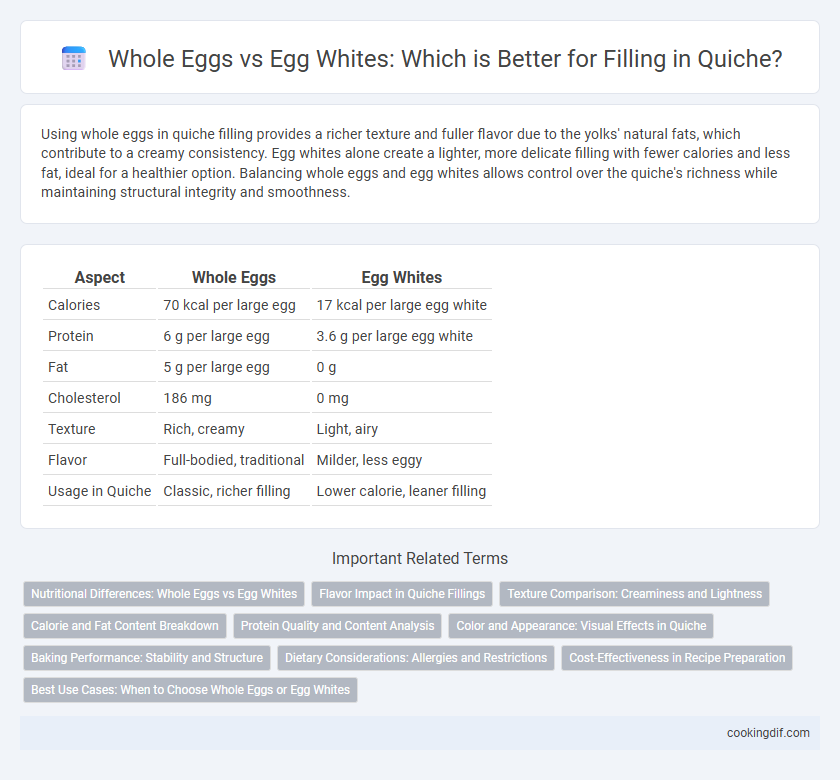Using whole eggs in quiche filling provides a richer texture and fuller flavor due to the yolks' natural fats, which contribute to a creamy consistency. Egg whites alone create a lighter, more delicate filling with fewer calories and less fat, ideal for a healthier option. Balancing whole eggs and egg whites allows control over the quiche's richness while maintaining structural integrity and smoothness.
Table of Comparison
| Aspect | Whole Eggs | Egg Whites |
|---|---|---|
| Calories | 70 kcal per large egg | 17 kcal per large egg white |
| Protein | 6 g per large egg | 3.6 g per large egg white |
| Fat | 5 g per large egg | 0 g |
| Cholesterol | 186 mg | 0 mg |
| Texture | Rich, creamy | Light, airy |
| Flavor | Full-bodied, traditional | Milder, less eggy |
| Usage in Quiche | Classic, richer filling | Lower calorie, leaner filling |
Nutritional Differences: Whole Eggs vs Egg Whites
Whole eggs provide a balanced source of protein, healthy fats, and essential vitamins such as vitamin D, B12, and choline, which are crucial for brain health and metabolism. Egg whites contain nearly pure protein with minimal calories and virtually no fat or cholesterol, making them ideal for low-fat, low-cholesterol diets. Using whole eggs in quiche filling contributes to richer flavor and creamier texture while egg whites offer a lighter, protein-packed option with fewer calories and no dietary cholesterol.
Flavor Impact in Quiche Fillings
Whole eggs provide a rich, creamy texture and pronounced flavor to quiche fillings, which enhances the overall taste experience. Egg yolks contribute essential fats and emulsifiers that intensify mouthfeel and deepen the savory profile. Using only egg whites results in a lighter, less flavorful filling that lacks the fullness and complexity provided by the yolks.
Texture Comparison: Creaminess and Lightness
Using whole eggs in quiche filling creates a rich, creamy texture due to the fat content in the yolks, enhancing the overall mouthfeel and binding ingredients smoothly. Egg whites alone yield a lighter, more airy consistency but can result in a less cohesive and slightly rubbery texture when baked. Balancing whole eggs and whites allows for a filling that is both creamy and light, optimizing texture without sacrificing richness.
Calorie and Fat Content Breakdown
Whole eggs in quiche fillings contribute higher calorie and fat content due to the yolks, which contain around 55 calories and 4.5 grams of fat each, including healthy fats and cholesterol. Egg whites provide a lower-calorie, low-fat alternative with approximately 17 calories and negligible fat per white, reducing overall quiche richness. Using whole eggs results in creamier texture and richer flavor, while egg whites create a lighter, lower-fat filling ideal for calorie-conscious recipes.
Protein Quality and Content Analysis
Whole eggs provide a balanced protein profile with all nine essential amino acids, making them a complete protein source ideal for quiche filling. Egg whites offer a higher concentration of protein per calorie and contain minimal fat and cholesterol, beneficial for leaner dietary options. Analyzing protein content, whole eggs average 6 grams per large egg, while egg whites contain approximately 3.6 grams, emphasizing the importance of whole eggs for richer protein quality in quiche recipes.
Color and Appearance: Visual Effects in Quiche
Using whole eggs in quiche filling results in a richer yellow hue and a glossy surface that enhances visual appeal, while egg whites alone produce a paler, less vibrant color with a matte finish. The yolk's natural pigments contribute to a creamy, golden tone that signals richness and flavor, important for an inviting presentation. Incorporating whole eggs achieves a visually balanced custard texture, improving the quiche's overall aesthetic impact.
Baking Performance: Stability and Structure
Whole eggs contribute superior baking performance in quiche filling due to their balanced ratio of fat, protein, and water, which ensures optimal stability and structure. Egg whites primarily provide protein that coagulates to form a firm network but lack the fat needed for a tender, creamy texture, resulting in a denser filling. The yolk's emulsifying properties enhance the quiche's smoothness and overall structural integrity, producing a well-set, resilient custard.
Dietary Considerations: Allergies and Restrictions
Whole eggs in quiche provide essential nutrients including fat-soluble vitamins and healthy fats, but may pose allergenic risks for individuals with egg allergies or those on low-cholesterol diets. Using egg whites for the filling reduces fat and cholesterol content, making the dish more suitable for heart-healthy and low-fat dietary plans while minimizing allergenic allergens found in yolks. Egg white-based quiches also cater to vegan sensitivities when paired with plant-based substitutes, addressing dietary restrictions and allergy concerns effectively.
Cost-Effectiveness in Recipe Preparation
Using whole eggs in quiche filling offers greater cost-effectiveness compared to egg whites alone, as whole eggs provide both protein and fat essential for texture and flavor at a lower price per serving. Egg whites, while lower in calories and fat, often require additional ingredients like yolks or cream to achieve similar richness, increasing overall recipe costs. Choosing whole eggs simplifies preparation and reduces expenses without compromising the traditional creamy consistency of quiche.
Best Use Cases: When to Choose Whole Eggs or Egg Whites
Whole eggs provide a richer, creamier quiche filling due to their yolks' fat content, ideal for classic recipes or when a custardy texture is desired. Egg whites offer a lighter, lower-cholesterol option, perfect for health-conscious eaters or when mixing with vegetables and lean proteins to keep the quiche airy and less dense. Choosing whole eggs enhances flavor depth and structure, while egg whites improve calorie control and create a fluffier consistency in the filling.
whole eggs vs egg whites for filling Infographic

 cookingdif.com
cookingdif.com